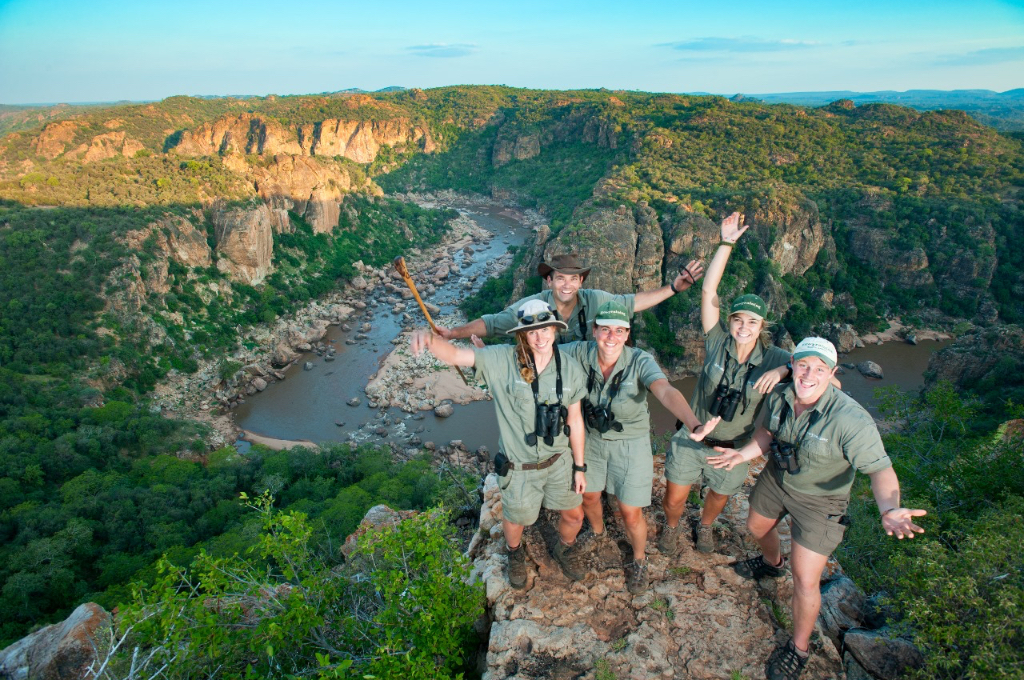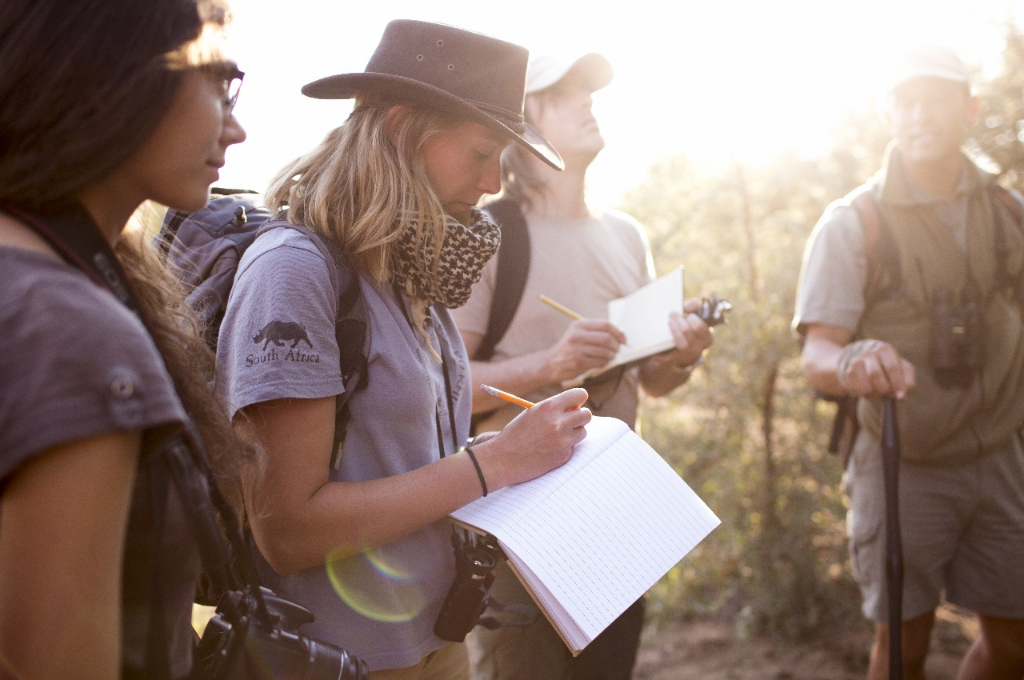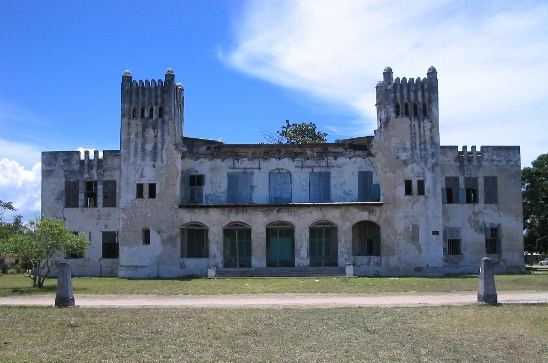Quick Itinerary Overview
Training Ranger Experience – 7 Day - South Africa.
To provide participants with an introduction to African wildlife and the natural environment, in an enjoyable and exciting way. The course will teach ethical behaviour in natural environments as well as conservation initiatives that everyone can contribute to in their day to day life. The objective is for participants to understand the underlying elements that support this amazing variety of life such as geology, soils, plants and climate as well as how the both small and large organisms and species interact with one another and their environment.
Curriculum.
Ecology forms the basis of this course and the basic principles of ecology are: "Study of the House” earth's ecosystem that includes both the living and non-living parts of the environment. Plants, animals, fungi, protists and bacteria as well as the rocks, water and atmosphere make up your average ecosystem. Once this is grasped it is easy to see how a change in one part of an ecosystem might very well affect all the other parts.
A typical day will include.
• Drumbeats start the early morning with tea/coffee.
• A daybreak drive or walk, focusing on the topic of the day.
• Return to camp for a hearty cooked breakfast.
• Debriefing on morning activities observations/ lessons
• Midday lecture
• Free time or leisure activities
• Mid-afternoon light lunch
• Afternoon drive or walk, focusing on the day’s lecture theme ended with sundowners.
• Dinner and debriefing on the evening activities’ observations and lessons
Variations to typical schedule may include.
• Full day activity for tracking and trailing
• Full day activity for navigational walks
o Both will incorporate general observations and learning.
o Sleep-out incorporating bush survival skills of locating and sourcing water, preparing a fire, and
ensuring location is safe etc.
• Evening activities may include star gazing (astronomy)
Itinerary
Day 1: Welcome to Makuleke
14:00 Estimated Arrival Time at Pafuri Gate – Kruger National Park
• Upon arrival a safety briefing will be conducted, an orientation of camp as well as an introduction to the staff.
• Participants will be shown to their accommodation, followed by time to settle in as well as time to prepare for the afternoon activity (dependent on arrival time). Afternoon Activity
• A late afternoon activity which will be a game drive and night drive to introduce the participants to the reserve and the night sky.
Day 2: Ecology & Geology
Morning activity:
• A morning activity which will either be in the form of game drive or bush walk.
• Focus on the Ecology and Geology of the surrounding areas. Noon discussion and practical experience:
• Interactive discussion by instructor based on Ecology and Geology understanding the inter-relatedness and with a focus on the local area, including Geology and Soils, Weather and Atmosphere, Food Web and Energy Flow, Habitat Ecology and Conservation.
Afternoon activity: • Afternoon activity which will either be in the form of game drive or bush walk.
• Incorporating general game viewing, with emphasis on the
Basic Ecology and Geology – topics covered during the Noon
Discussion.
Day 3: Tracks and Tracking
Morning Activity:
• Morning activities which will be in the form of a bush walk focusing on Animal Track Identification. Noon Discussion and Practical Experience:
• Interactive discussion by instructor based on Introduction to Animal Tracks and Tracking.
• Discussion topics and practical experiments to include: Introduction to basic Tracks, basic Track Identification as well as basic Animal Trailing Skills
Afternoon Activity: • Afternoon activity which will be in the form of a bush walk focusing on the topics covered during the midday lecture and incorporating Animal Tracks and Trailing.
Day 4: Bird Identification and Behaviour
Morning Activity:
• A morning walking activity focusing on Bird Identification and Behaviour. This includes Bird Identification, understanding Bird behaviour as well as how to use Bird Reference guides. Noon Discussion and Practical Experience:
• Interactive discussion by instructor based on Bird Identification and Behaviour.
• Discussion topics and practical experiments to include: Bird Identification, Understanding Bird Behaviour & How to use Bird Reference guides.
Afternoon Activity: • Game drive, combining with a walk and incorporating general game drive viewing, with emphasis on Bird and ID and Behaviour. Incorporating common species found in the local area.
Day 5: Navigation and Orientation
Morning Activity:
• Trail from camp focusing on Navigation and Orientation and how to use nature as a tool to navigate and orientate yourself in the bush and make your way to your midday picnic spot. Noon Discussion and Practical Experience out in the field:
• Interactive discussion by instructor based on Navigation and Orientation as well as Bush Skills.
• Discussion topics and practical experiments to include basic practical skills including use of landmarks, sun, compass and maps for Navigation and Orientation.
Afternoon Activity: • Game drive, combining with a walk if there are interests, and incorporating general game drive viewing, with emphasis on Navigation and Orientation.
Day 6: Animal Identification and Behaviour
Morning Activity:
• A morning activity which will either be in the form of a game drive or bush walk.
• Trail from camp focusing on Animal Identification and Behaviour. Emphasis on Mammals, Amphibians, Reptile, Fish and Arthropods. Noon Discussion and Practical Experience:
• Interactive discussion by instructor based on Animal Identification and Behaviour.
• Discussion topics and practical experiments to include: Introduction to Mammals, Amphibians, Reptiles, Fish and Arthropods Afternoon Activity:
• Game drive, combining with a walk if there are interests, and incorporating general game drive viewing, with emphasis on Animal Identification and Behaviour and extra focus on Big Game Animals.
Day 7: All good things come to an end
Short activity drive with hotbox for last coffee/tea as the sun rises and provides an opportunity for students to sit in silence and just “be in nature”. Return to camp for packing and departure @ 09:00am
: Northern Kruger
Makuleke Camp, Makuleke Concession, Northern Kruger.
The Concession: Situated between the Limpopo and the Levuvhu Rivers in the northern sector of Kruger National Park is the Pafuri region, an area spanning 24,000 hectares (59305 acres). Within the Pafuri area is the Makuleke Concession, the ancestral home of the Makuleke people and the most diverse and scenically attractive area in all of Kruger National Park.
The Makuleke concession is not accessible to the ordinary tourist visiting the park. This area belongs to the Makuleke community. This is quite a historical event for South Africa as the Makuleke people were removed from this area in 1968 and after a lengthy process it was finally re-instated to the community in 1998 after a very long struggle. This area is certainly the wildest and most remote part of the Kruger National Park and offers varied
vegetation, great wildlife viewing, the best birding in all of the Kruger National Park and is filled with folklore of the early explorers and ancient civilizations.
The camp: EcoTraining’s Kruger National Park Camp is situated in the Makuleke concession. The camp is situated between the Limpopo and Levuvhu Rivers. This is a true wilderness area, steeped in history and situated in the remotest part of Kruger in one of the most biologically
diverse areas. Scenery ranges from the beautiful, quietly flowing Levuvhu River shaded by Nyala trees and fever tree forests and teeming with hippos and crocodiles; to the awesome Lanner Gorge, palm-fringed wetlands, and
rocky outcrops with thousand-year-old baobab trees. We employ members of the Makuleke community at our camp and there is a lot of history in the area that is exciting to learn about.
Animals found in the Makuleke Concession (Kruger National Park): All the wildlife that one would expect to see in a great national park such as Kruger can potentially be encountered on the concession: plains game such as zebra, kudu, impala, with nyala antelope in abundance. Lions and leopards are a special sighting, herds of elephant, African buffalo, and a growing herd of blue wildebeest, plus seldom-seen animals such as eland, bush pig and aardvark.
There is abundant birdlife. This part of Kruger is known to be one of the best birding areas in the park and is home to rarely seen species such as Pel's Fishing Owl, Three-banded Courser, and Grey-headed Parrot.
Temperatures at the camp: In the Kruger National Park you'll find a subtropical climate, with hot summers (average 40 ̊C 104 F) and warm, dry winters (average minimum 9.3 ̊C and average maximum 26.3 ̊C). However,
be sure not to be caught out by the intermittent summer rains which fall between October and March. Early mornings and late afternoon/evenings during the winter do get very cold, so be sure to bring sufficient warm clothing.
Accommodation: Students are accommodated in comfortable thatched, tented units placed on wooden decks in the shade of large nyala trees. Each unit has an en-suite bathroom consisting of a shower, washbasin with hot
running water and a flush toilet and has a veranda. We provide learners with bedding (a duvet and a pillow), but you might want to bring an extra blanket for the winter months and an additional pillow if you require two. The camp itself is not fenced which means that animals do move through the camp from time to time.
The central communal area consists of a thatch-roofed open sided deck where all meals, lectures and studying takes place. A clearing for evening campfires creates an idyllic setting for social and leisure time.
Karongwe camp, Karongwe Game Reserve, Southern Kruger.
The Concession: Karongwe Camp is on the banks of the Karongwe River (mostly a dry riverbed) in the 9 000- hectare (22 239 acre) Karongwe Game Reserve, which is to the south-west of the Kruger National Park. Through
Karongwe Game Reserve flow three rivers which are tributaries of the Olifants River, carving their way through the bedrock and dividing the reserve. The vegetation of the reserve falls within the Savannah Biome of southern Africa with distinct vegetation zones being represented – mixed Lowveld and Mopane bushveld along with grass savannah, riverine vegetation, and rocky outcrops.
Karongwe has the following habitats: undulating hills and valleys and broad-leafed woodland. We are allowed traversing over some sections of the reserve. As we share the reserve with other lodges / tourism operators, we do need to consider each other’s game viewing privacy.
Animals found in Karongwe Game Reserve: Karongwe is a good place for viewing most of Africa’s game. As the camp itself is unfenced, we often have four-legged guests in the camp. Hyenas have been seen making patrols of the camp and on some night’s elephant, cheetah and lion have also made appearances in camp on the odd occasion.
Temperatures at the camp: Our summers are warm to hot, with temperatures ranging from mid-20°C (68°F) on the cooler cloud-covered rainy days, to the high 30°C (86°F) on average days. Occasional hot day’s
temperatures exceed 40°C (104°F). Winters are usually dry, with the average morning temperature of 6°C (43°F), with occasional cooler morning temperatures, and warmer mornings when there is cloud cover. Afternoon temperatures average in the mid-20s°C (68°F), with ranges of 18°C (65°F) to 32°C (89°F) expected. Occasional winter showers prevail but are unusual.
Rain in the summer takes the form of heavy thundershowers, or frontal rainfall over a longer period of time.
Accommodation: The camp consists of 10 walk-in style Meru tents, with twin beds (students share tents) and supplied bedding (a duvet and one pillow); although you might want to bring an extra blanket for the winter
months and an additional pillow should you require two. There are also shared ablution facilities and a central communal area. We can accommodate a maximum of 20 students. There are viewing decks in the central area of the camp, and many students choose to make the viewing decks their “bedroom” for part of or for the full duration of the course. The camp itself is unfenced.
The central communal area: This area is made up of four tall thatch-roofed open-sided decks which forms a square that encloses an open campfire area. One of the deck structures serves as the open-air dining area, lecture
room and study area. Two decks remain open to welcome the adventurous who want to spend their nights as close to nature as possible, while the last deck is the home of the head instructor.
WHATS INCLUDED?
- All Accommodation as per the itinerary.
WHATS EXCLUDED?
- All flights International and domestic.
Map
AFILLIATES, ASSOCIATIONS & PARTNERSHIPS







